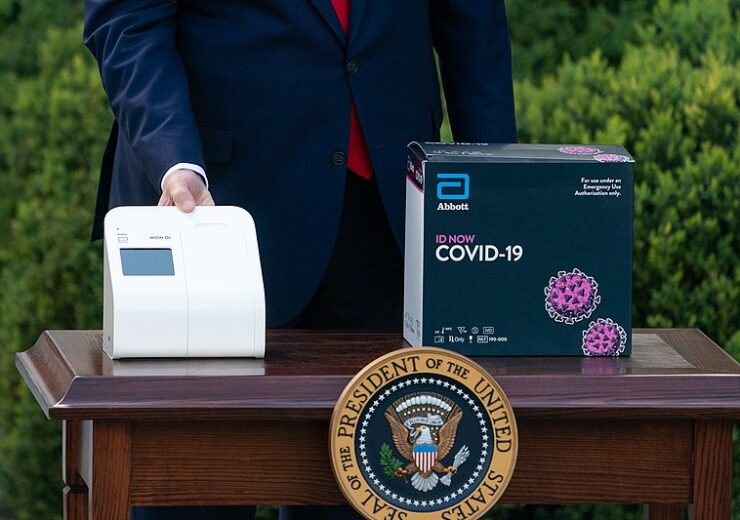The data from interim post-authorisation study showed an overall performance of 93.3% sensitivity and 98.4% specificity for ID NOW rapid Covid-19 test

ID NOW Covid-19 testing kit from Abbott Laboratories. (Credit: The White House from Washington, DC/Wikipedia.)
Abbott has unveiled new interim analyses from the study results of its rapid Covid-19 test ID NOW, which showed an overall sensitivity of 93.3% and specificity of 98.4%.
The medical devices maker said that the interim results are in line with the data submitted to the US Food and Drug Administration (FDA) in March for Emergency Use Authorization (EUA) and the interim results announced in May 2020.
Initially launched in 2014, ID NOW is a molecular point-of-care platform, designed to facilitate Influenza A and B, Streptococcus A and RSV testing in the US.
The rapid testing device deploys advanced isothermal nucleic acid amplification technology, to offer molecular results within minutes, helping clinicians in making evidence-based clinical decisions.
Abbott president and chief executive officer Robert Ford said: “We recognise there is a lot of discussion about testing and ID NOW, and we want to make sure the public has the facts and real-world data.
“The facts we’re seeing from one of the largest clinical studies of any Covid-19 test, conducted at some of the nation’s leading academic centres, show that ID NOW delivers effective, consistent and reliable performance.”
The company’s interim analysis includes the results from the post-authorisation study of its ID NOW, in a total of 1,003 people across acute care, and in-patient care environments, in urgent care clinics and hospitals and nursing homes respectively.
In the study, ID NOW showed an overall performance of 93.3% sensitivity (positive agreement) and 98.4% specificity (negative agreement).
Also, the test showed 95% sensitivity and 97.9% specificity within seven days after the onset of symptoms in the subjects, along with 94.6% sensitivity and 97.6% specificity in symptomatic subjects.
Abbott also provided updates to the studies covered in previous interim analysis
Along with the post-authorisation data, the company has offered updates to the three studies including a multi-site urgent care study, Everett Clinic study, and an in-patient study, covered in its previous interim study.
The urgent care study in 430 symptomatic patients showed 96.2% sensitivity and 99.5% specificity for ID NOW, while the study of 974 people at Everett Clinic in Washington showed 91.3% sensitivity and 100% specificity, compared to lab-based molecular PCR tests.
Furthermore, the in-patient care study conducted in a total of 518 symptomatic patients, at hospitals and nursing homes showed 79.8% sensitivity and 94.3% specificity.
Abbott diagnostics business applied research and technology divisional vice president John Hackett said: “In the beginning of the pandemic, the scientific community had to rely on samples and modelling to predict test performance.
“But now we have a significant body of real-world, clinical data that support the critical role ID NOW is playing in identifying infection rapidly in places where people show up for care. Tests are taken at a moment in time and they detect the virus once there’s enough viral material in a person to be able to detect it.
“While there’s no perfect test, to fight a pandemic, we need a combination of gold standard lab-based PCR and accurate, reliable rapid tests like ID NOW to help reduce risk in society and slow the spread of the virus.”
